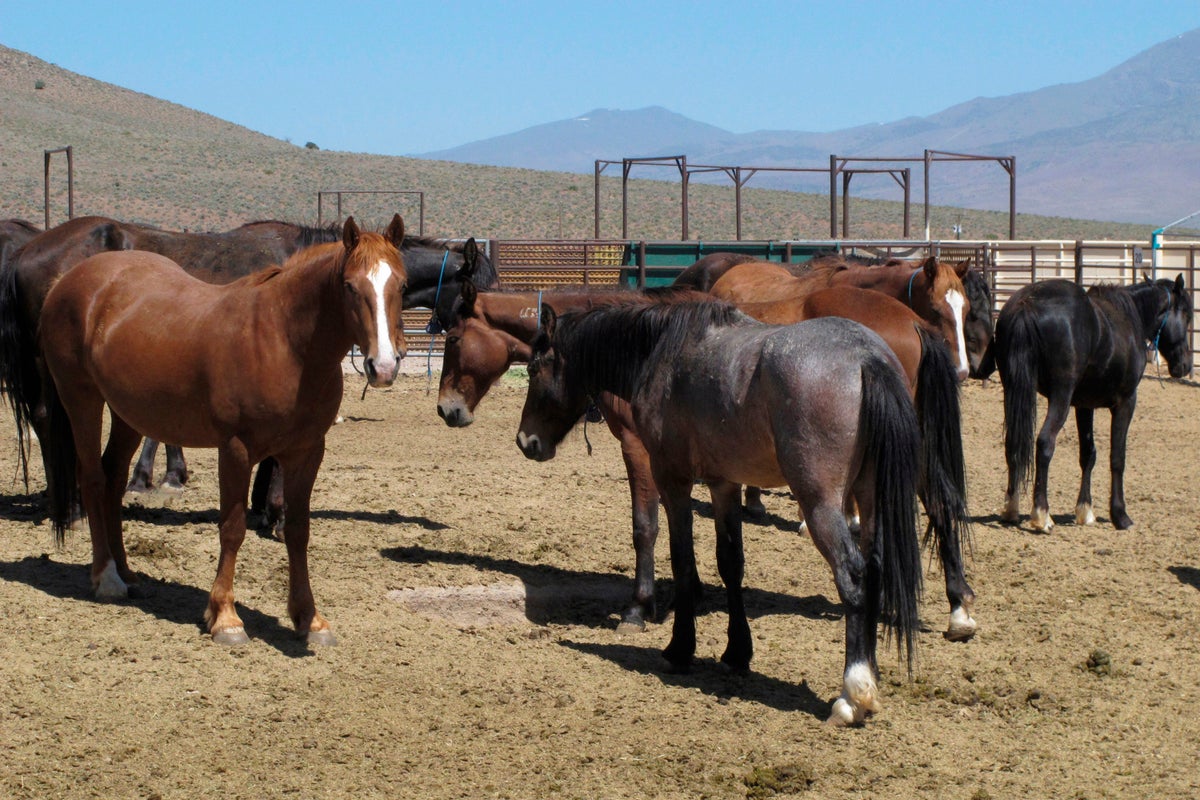
Advocates for wild horses are accusing federal land managers of illegally approving plans for the largest U.S. holding facility for thousands of mustangs captured on public rangeland in 10 Western states.
Friends of Animals said in a lawsuit filed Tuesday up to 4,000 horses would be held captive inhumanely for months or years at a time in dusty, manure-filled pens without shade or wind-breaks in Nevada’s high desert.
At a cost of of millions of dollars annually to U.S. taxpayers, the lawsuit says it's part of the government's misguided effort to appease ranchers by accelerating roundups of mustangs competing with their livestock for public forage across much of the drought-stricken West.
The lawsuit filed in U.S. district court in Reno says the Interior Department's Bureau of Land Management broke multiple environmental and animal protection laws when it “rushed through the approval process without considering the impacts of the unprecedented facility on wild horses and burros or the local community.”
Interior Department spokesman Tyler Cherry said in an email that neither the department nor the bureau had any comment.
The bureau said in announcing solicitations for bids for the corral in late 2020 that more space was needed to facilitate roundups of what it says is an overpopulation of wild horse herds causing ecological damage to the range.
The bureau wrongly concluded a full-blown, year-long environmental impact review wasn't necessary for JS Livestock Inc.'s holding pens on 100 acres (40 hectares) of private land near Winnemucca, about 170 miles (273 kilometers) northeast east of Reno, the lawsuit said.
Jennifer Best, director of Friends of Animals Wildlife Law Program, said agency officials who approved the project in November failed to adequately respond to concerns raised about disease transmission, animal waste, disposal of dead animals, groundwater contamination and “air quality in terms of odor and dust.”
The less-rigorous environmental assessment the agency completed improperly relies on state permits and other documents in an attempt to satisfy the reviews required under the National Environmental Policy Act, the lawsuit said.
Among other things, the suit says the agency will require JS Livestock to clean the 40 pens that can hold up to 100 cattle as few as two times a year. Every six months, 100 horses will produce 465 tons (421 metric tons) of waste in a 750-square-foot (70 square-meter) pen and 4,000 animals would produce 18,000 tons (16,329 metric tons), it said.
“BLM’s decision stinks,” said Priscilla Feral, president of Friends of Animals. “If the BLM based its decisions on science and not placating the meat industry that wants wild horses to go extinct, the agency would keep its hands off wild horses."
The suit says the bureau gave short shrift to numerous potential impacts, including noise the agency’s review concluded wouldn't significantly differ from the existing land use — an alfalfa field.
“BLM did not explain how a facility with 4,000 wild horses and burros will have the same level of noise as alfalfa,” it said.
JS Livestock didn't immediately respond to an email requesting comment. Jennifer Erickson, a woman listed as a company officer, declined immediate comment when reached by phone on Wednesday.
The National Cattlemen's Beef Association and its Public Lands Council are among those who back the Biden administration's efforts to reduce what it says is an overpopulation of wild horses on federal lands.
“This isn’t the first time a litigious activist group has thrown themselves in the way of meaningful progress on this crisis, and it won’t be the last," said Sigrid Johannes, an associate director of the groups.
“Off-range corrals are a legitimate – and badly needed – tool in the toolbox for managing critically overpopulated” areas, she said in an email Wednesday.
Nevada is home to about half the 86,000 horses roaming federal lands in 10 states, including Arizona, California, Colorado, Idaho, North Dakota, New Mexico, Oregon, Utah and Wyoming.
The bureau announced in January it planned to permanently remove 19,000 wild horses and burros in 2022, the most ever in a single year.
As of last month, more than 58,000 wild horses and burros were being housed in holding pens and off-range pastures at a cost to taxpayers of $50 million annually, the lawsuit said.
The lawsuit said the 2022 roundup schedule relied on the opening of the holding facility in Winnemucca. The largest holding facility currently in operation at Palomino Valley just north of Reno has a capacity of 1,800.







